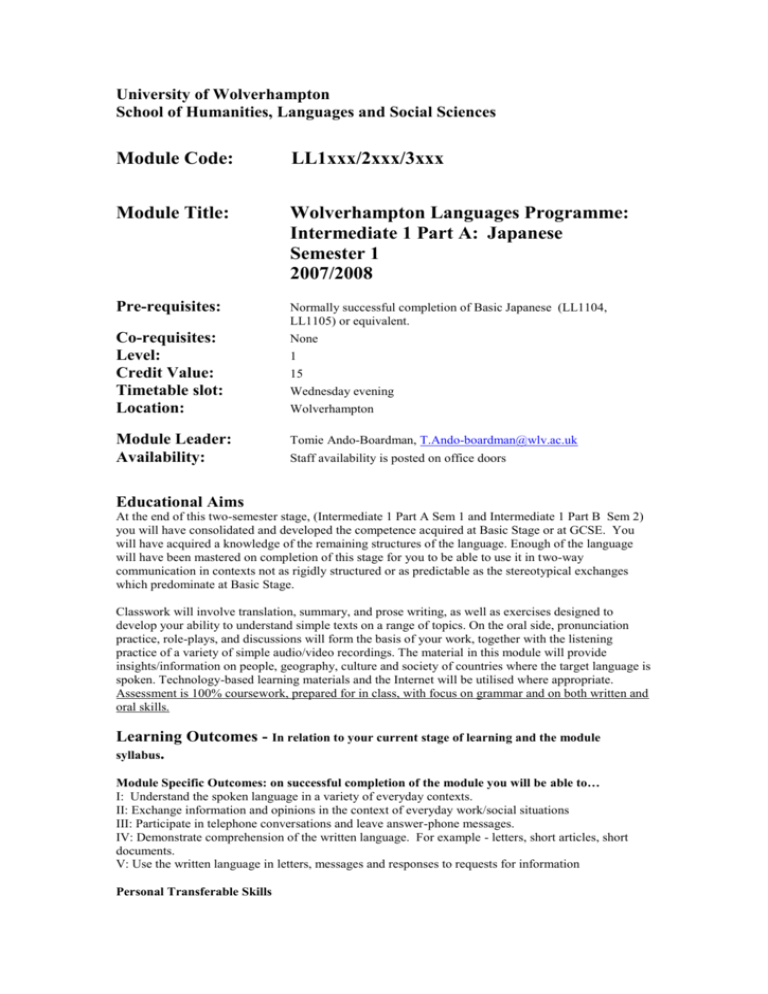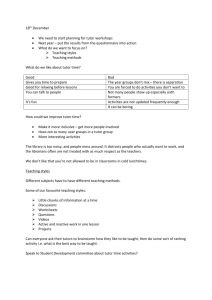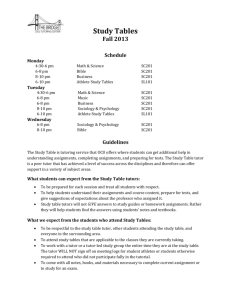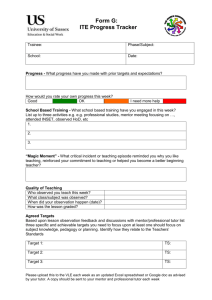ASP2 Home Page - University of Wolverhampton
advertisement

University of Wolverhampton School of Humanities, Languages and Social Sciences Module Code: LL1xxx/2xxx/3xxx Module Title: Wolverhampton Languages Programme: Intermediate 1 Part A: Japanese Semester 1 2007/2008 Pre-requisites: Normally successful completion of Basic Japanese (LL1104, LL1105) or equivalent. None Co-requisites: Level: Credit Value: Timetable slot: Location: Module Leader: Availability: 1 15 Wednesday evening Wolverhampton Tomie Ando-Boardman, T.Ando-boardman@wlv.ac.uk Staff availability is posted on office doors Educational Aims At the end of this two-semester stage, (Intermediate 1 Part A Sem 1 and Intermediate 1 Part B Sem 2) you will have consolidated and developed the competence acquired at Basic Stage or at GCSE. You will have acquired a knowledge of the remaining structures of the language. Enough of the language will have been mastered on completion of this stage for you to be able to use it in two-way communication in contexts not as rigidly structured or as predictable as the stereotypical exchanges which predominate at Basic Stage. Classwork will involve translation, summary, and prose writing, as well as exercises designed to develop your ability to understand simple texts on a range of topics. On the oral side, pronunciation practice, role-plays, and discussions will form the basis of your work, together with the listening practice of a variety of simple audio/video recordings. The material in this module will provide insights/information on people, geography, culture and society of countries where the target language is spoken. Technology-based learning materials and the Internet will be utilised where appropriate. Assessment is 100% coursework, prepared for in class, with focus on grammar and on both written and oral skills. Learning Outcomes - In relation to your current stage of learning and the module syllabus. Module Specific Outcomes: on successful completion of the module you will be able to… I: Understand the spoken language in a variety of everyday contexts. II: Exchange information and opinions in the context of everyday work/social situations III: Participate in telephone conversations and leave answer-phone messages. IV: Demonstrate comprehension of the written language. For example - letters, short articles, short documents. V: Use the written language in letters, messages and responses to requests for information Personal Transferable Skills 1: Communicate effectively in both written and oral form 2: Gather information from both written and oral sources 3: Develop appropriate language learning strategies 4: Organise yourself effectively using good time-management skills 5: Work effectively, both independently and in teams, in both written and oral contexts 6: Apply information technology skills (e.g. word-processing) and exploit the Internet appropriately/critically Weekly programme (1x3hrs contact per week) WEEK NO Date WORK / ASSIGNMENT TASK Week 1 24 Sep 07 mixed language skill activities Week 2 01 Oct 07 mixed language skill activities Week 3 mixed language skill activities Language strand test Week 4 mixed language skill activities Week 5 mixed language skill activities Week 6 oral presentation Week 7 reading comprehension Week 8 mixed language skill activities Week 9 mixed language skill activities Language strand test Week 10 mixed language skill activities Week 11 listening comprehension Week 12 writing in Japanese Language strand test CHRISTMAS VACATION Key Learning Resources Indicative Reading Recommended for Purchase/Essential Texts 'Interactive Japanese 2' by Sakura Books 'From Hiragana to Katakana' by Sakura Books Japanese / English Dictionary (as costs allow) Recommended Texts Japanese Language and People (BBC) Nakamura, Hajime Ways of Thinking of Eastern Peoples The University Press of Hawaii, 1974 Sansom George A History of Japan Tuttle 1990 Kerr Alex Dogs and Demons: The Fall of Modern Japan Penguin 2001 Learning Activities/Teaching Methods All students will have 3 class-hours a week with a lecturer, in which you may; take part in role-plays, simulations, discussions, listening comprehensions based on material prepared at home give an oral presentation based on research into a topic focus on pronunciation skills summarise or translate texts revise/study grammar and vocabulary and check corrections to written and oral work prepare for and take part in assessed work receive guidance on how to make the most of the language learning resources at your disposal Workload 3 hrs with Group Tutor 7 hrs self-directed study If you do not spend the recommended amount of time and effort on your studies (revising grammar and vocabulary, preparing for forthcoming classes, preparing assignments) you will not make the necessary progress. Your tutor will be pleased to advise you on how to make the most of your selfdirected study. Organise your time now! Attendance: The University wants all students to achieve their best performance. It offers you carefully prepared learning experiences that will enable you to meet the learning outcomes of your modules. Evidence shows that you will perform best if you regularly attend and participate in these learning experiences. It therefore expects you to participate fully in the learning experience. Where you are unable to attend for good reason you should discuss this with your module tutor who will make reasonable efforts to provide alternative arrangements (e.g. issue support materials). Where you do not attend without good reason you cannot expect your tutor to devote additional time and resources to your learning. If you are unhappy with the learning experiences provided you should make your views known through the normal channels (e.g. staff/student liaison committees, module evaluation or Student Union). Assessment Methods and Weightings 2 mixed skill language assignments + language strand (exercises and tests) Weighting: assignments : language strand = 2:1 Assignment tasks over each semester will cover all four language skills and, if so desired, tasks may be combined and integrated to form two major Assignments. Assessment criteria will be provided with each Assignment Brief. This module has only one component, made up of a number of elements. In order to pass the module you must gain a minimum of D5, and have completed at least 50% of the work set. Referencing for Assignments You must follow the Harvard System of referencing for any sources used in your written assignments. Details of this system can be found at http://www.wlv.ac.uk/lib/systems/gt-harvard-1.htm or in the booklet available from any University Learning Centre. Deadlines & Submission See table above. Work should be submitted to the tutor or module leader as instructed, by the deadline. Unauthorised late submissions will receive a grade of F0. Extensions: If you experience an illness or other serious personal difficulty, which prevents you from completing an assignment, you may request an extension to the submission deadline. Where an extension is granted this will normally be for 2/3 days. In exceptional cases a maximum of seven days extension will be granted Requests for extensions must normally be made before the assignment deadline. To apply for an extension you must complete a POG33 form, which is available from a Campus Registry or the HLSS School Office (MC310). You must hand this form into the School Office (MC310). Senior Academic Counsellors /Associate Dean will then consider your request. You may be asked to make an appointment to see a Senior Academic Counsellor/Associate Dean. Individual module leaders cannot grant extensions. Return of Work/Collection Arrangements: The normal expectation is that student work will be returned within a three working week period from the submission date. Collecting your work is very important since the written feedback provided on it will help you understand why you have received a particular grade. It will also help you to improve your work and develop your skills and knowledge further. It is your responsibility to collect your work. You can do this in the following ways: collect your work from the module leader in the first language session in semester 2 attach a stamped addressed A4 envelope to your work when you submit your work to the module leader, and this will be posted to you (however, we accept NO responsibility for any items lost during transit). You must do one of the above. Module Grades/Compensation and Failure: Read this in conjunction with the University Regulations. You can find information about the academic regulations by opening the University Web Page (www.wlv.ac.uk), select Current Students, then Academic Information and then Academic Regulations. Also the School has academic information on WOLF – select HLSS Academic Information. Information can also be found in Campus Registries and Campus Learning Centres. You should also regularly consult subject notice boards in MC Building and School notice boards outside MC310. To pass a module you need to achieve an overall module grade in the range D5 - A16. For Level 1 and 2 modules: If you achieve an overall module grade in the range E4- F1 you may have the right to resit the module. This means that you repeat the failed assessment(s) without having to study the whole module again. When you resit a module you are limited to a maximum grade of D5 for the assessment(s) regardless of your actual performance in the resit. The overall module grade will then be calculated including the D5 component(s). If you fail the module for the second time, you then have the right to retake the module, which means you must register for the module again and all the assessments for the module must be taken again. At both level 1 and level 2 BUT not level 3, if you have achieved at least 90 credits you will be compensated for marginal failure (grade E4) in up to 30 credits at each level. This means that the Award Assessment Board will give you credits for the module though the E4 will remain unchanged. If you are given compensation, you may not resit the module. Assessment tasks See Above Assessment Criteria Assessment criteria will be provided with each Assignment Brief. Coursework retrieval. Retrieval of Written elements and Language Strand Tests A reading comprehension, a written exercise or a language strand test will be set, depending on which written element needs to be retrieved. Retrieval of Oral and Listening elements Listening comprehension or one-to-one conversation will be set, depending on which oral element needs to be retrieved. Please note that Submission deadlines for resit coursework and examinations are published on subject notice boards in MC building, outside the School Office MC310 and on WOLF – select HLSS Academic Information. Registration: Students need to ensure they are registered on this module.:V Student Representative Should you have any issues at all that you want to discuss with your student representative or wish the representative to raise at an appropriate meeting on your behalf then please e-mail HLSSrep@wolvesunion.org. Consequences of cheating/plagiarism. The University takes academic misconduct very seriously. It can be defined as any of the following: - Cheating: Cheating is defined as any attempt by a candidate to gain unfair advantage in an assessment by dishonest means and includes all breaches of examination room rules, impersonating another candidate, falsifying data and obtaining an examination paper in advance of its authorised release. Plagiarism: Plagiarism is defined as incorporating un-attributed direct quotation from, or un-attributed substantial paraphrasing of, the work of another, into your own assessments. This work may be published in books or articles or electronically on the web for example. Collusion Collusion occurs when two or more students produce the same assignment for assessment and submit it as if it was solely their own work. Penalties Where an offence is admitted, or a panel decides that cheating, plagiarism or collusion has occurred, a penalty will be imposed. The severity of the penalty will vary according to the nature of the offence and the level of study. Penalties will range from failure of the assignment under investigation to a restriction of the award a student may ultimately achieve or a requirement to leave the University. Further information can be found on-line on the University web pages or from the Students’ Union. Behaviour/Expectations Consideration To establish and maintain a positive educational environment, and to enhance learning potential, students are urged to actively contribute by; Engaging positively and constructively in class dynamics Behaving with courtesy and respect for staff and fellow students Avoiding interruption or distraction. Mobile phones must be switched off for the duration of the class. Attendance You should devote a minimum of ten hours per week to this module including class time. Attendance at all language sessions is strongly recommended, as progress in language learning is heavily dependent on active, regular and sustained participation in class activities Failure to attend assessment at the set times will result in a grade of F0 You should inform your tutor beforehand of unavoidable absence, and request advice on how to catch up on work missed, consulting classmates after the lesson when possible. It is your responsibility to ensure that you do this without disrupting the progress of the class. Participation In H.E. the tutor provides a framework and opportunities for you to learn. It is your responsibility to participate fully in class and out, complete all homework set, work independently to improve your language skills, and reflect on and improve your performance. Your progress will depend directly on the amount of work you put in. Grades All assignments are marked according to a set of criteria to be found in the Languages Assessment Booklet on WOLF. Each assignment has a set of instructions which may further specify criteria for awarding grades. The main function of grades/feedback is to give you an evaluation of your progress and guidance on how you can improve in the future. If you have any queries about your grades, contact your group tutor in the first instance. Further queries may be dealt with by the Subject Coordinator and/or Subject Leader. Feedback The aim of feedback is to improve future performance. The tutor gives feedback to help you make swift progress in language learning You are asked to also provide feedback to the tutor to improve the course, bearing in mind of course the crucial role that your own positive approach and hard work play in the success of the module. The first channel is informal; feel free to express your views on course content and delivery to the tutor in a constructive manner whenever appropriate, and in addition the group tutor will request and record feedback from the class both mid- and end-of- semester and make appropriate adjustments. A formal channel is provided in two ways. Firstly, the Staff-Student Liaison Committee (SSLC) meets in Week 6 or 7 of each semester. The tutor will ask for a representative to attend to put forward the views of the class. These are formally recorded and acted upon where necessary. At the end of every module, you will also be asked to complete a Module evaluation Questionnaire which provides statistical information on student satisfaction and concerns. All of these mechanisms have slightly different purposes, and we ask for your patience in contributing to them. You do have the satisfaction however of knowing that we take your constructive feedback very seriously and will do all that we can to improve the benefit to you and your classmates of the module. Tandem Language Learning Opportunities: Every year there are a small number of Japanese students staying in Wolverhampton to study for one or possibly two semesters. There will be an opportunity to meet them at the start of each semester in order to arrange informal conversation exchange. These dates will be advertised to you in class. Difficulties/problems If you have any problems concerning your progress in this module approach group tutor first of all If the matter cannot be resolved with the group tutor, then the Subject Coordinator should be approached. If he/she cannot help then the matter will be referred to the Subject Leader for Languages If you wish to receive more guidance on general academic skills, including effective study, note-taking, and academic writing, then the Study Skills advisors for HLSS in MC424 will be happy to assist. If you have problems of a more general nature affecting your progress in all of your studies then you should contact your Personal Tutor or a Senior Academic Counsellor. Communication There are a number of ways to contact your group tutor. In addition to e-mail (most convenient) and telephone, staff are available during specified office hours posted on their office doors. You may also find it useful to consult the Languages notice board on the 4 th floor of MC Block, and the Languages Assessment Booklet, available on WOLF, where you can also find information on other modules in this subject area Please provide your group tutor with the e-mail address that you check most frequently and an up-to-date telephone number for urgent messages We hope that your experience on this module will be rewarding and stimulating, and request your participation and cooperation with the Module Team who are committed to helping you develop your full potential as a language learner. Name Date Valid Tomie Ando-Boardman Sept 2007 2007/08







